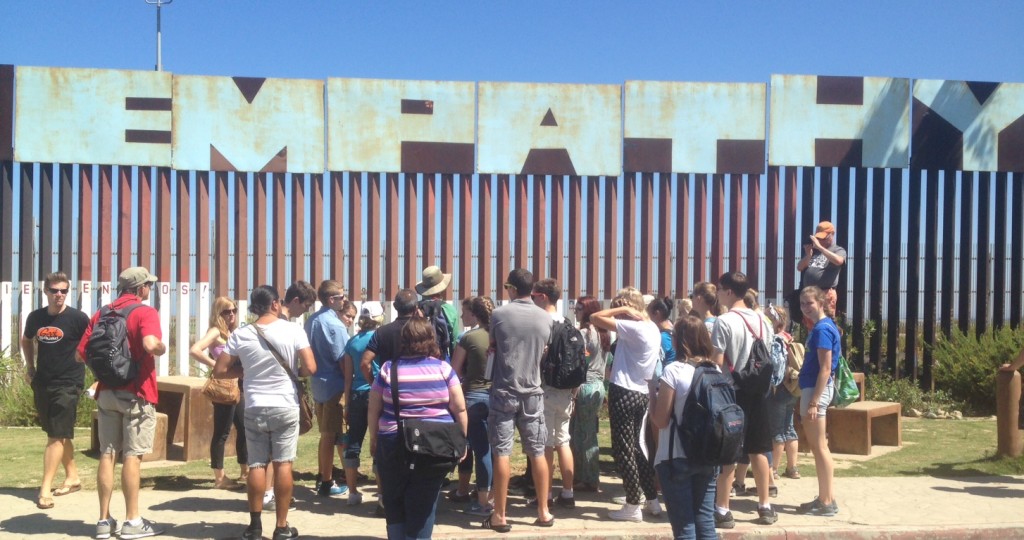 In recent years, my family has navigated some rough patches; death, cancer treatments, open heart surgeries, chronic disease, etc. Now, I’m certain this isn’t everyone’s experience, but mine has been that in these times of trauma or tragedy, family comes together to stand with one another as we wrestle through life’s crap. We aren’t picking fights, we are crying on each other’s shoulders.
In recent years, my family has navigated some rough patches; death, cancer treatments, open heart surgeries, chronic disease, etc. Now, I’m certain this isn’t everyone’s experience, but mine has been that in these times of trauma or tragedy, family comes together to stand with one another as we wrestle through life’s crap. We aren’t picking fights, we are crying on each other’s shoulders.
In recent months, our human family has been enduring an especially rough patch.
War.
Racism.
Suicide.
Deadly viruses.
Plane crashes.
Whether in remote villages or urban centers, few have been untouched (in some way) by the realities unfolding.
As I observe our corporate response to tragedy as a human family, and evaluate my own response in the midst of it, I have noticed something disturbing unfold. Rather than rally together as a family navigating a season of trauma, we have used this moment to divide, stir hatred and misunderstanding, point fingers and more than anything, view those on the opposite side of an issue as less than human.
Watching political pundits bark the party line or news anchors posture themselves as authority figures rather than conduits of curiosity, I find myself asking the question, “What keeps us from seeing others as human?”
And by human, I mean, divine image bearers who have stories, families, pain, hopes, traditions and a unique interpretation of reality.
Here are three barriers that are hijacking our ability to love our “enemies” and acknowledge our shared humanity:
1. Fear
Those of us in the West (and I’m sure many others around the globe) live in a culture of fear. It is a reality of “What If?” What if the robber breaks into my house? What if all of our jobs are taken by immigrants who don’t deserve to be here? What if the terrorists strike my city? What if that person walking on the street (who looks different than me) tries to jump me? What if the stock market crashes and I lose all my investments? What if (insert name) gets elected and everything goes to hell?
The Problem? We spend so much time trying to prepare for the “what if” that we completely miss out on the joy, beauty and opportunity right in front of us. Further, we project our fear on others and undeservedly make them the potential culprit. Because everyone is out to get us, we can no longer trust anyone and our worldview is largely pessimistic.
The Cure? “I tell you, my friends, do not fear those who kill the body, and after that have nothing more that they can do…Fear not; you are of more value than many sparrows…Whoever finds his life will lose it, and whoever loses his life for my sake will find it.” – Jesus (Luke 12)
In the end, if we truly believe Jesus is reigning, what do we have to fear?
2. Nationalism
Yes, we live in a country with unprecedented wealth, opportunity (for many) and infrastructure that has done remarkable things domestically and abroad. As I travel around the world, I don’t have to look far to run into people who dream to live in our country. There are so many reasons to be grateful to live here. With that said, it is deeply disturbing to me how inverse our allegiances have become within the Christian subculture. Many, out of reverence to our country, have placed their primary allegiance to the USA rather than to the Kingdom of God.
The Problem? Nationalism is a form of idolatry that we must repent from. Healthy love of country isn’t what I’m referring to. Nationalism is the belief that our country is somehow set apart over and above all other countries which leads to unquestionable support of our nation’s policies and practices even if they come at the expense of innocent human beings on the other side of the globe. Further, we often place our hope in our elected officials rather than in Jesus (who reigns as king of the Kingdom that has come and is coming). It means we – whether subconsciously or consciously – see people who live outside of our borders as “less than.” We may not admit it, but it is certainly the case. If our war machines take the lives of those half way across the world it is somehow easier to justify than if it were the life of one of our own.
The Cure? “My kingdom is not of this world. If my kingdom were of this world, my servants would have been fighting, that I might not be delivered over to the Jews. But my kingdom is not from the world. – Jesus (John 18:36)
May we daily submit ourselves first and foremost to the rule and reign of Jesus, praying, “Your Kingdom come, your will be done, on earth as it is in heaven.”
3. Power
The growing distance between those with economic and political power creates a social distance that doesn’t allow us to share tables with those who have differing degrees of power. Often, those in power don’t KNOW the people who their power impacts which leads to decisions that negatively impact those on the underside of power. The flip side is that those without power are willing to dehumanize others as a way to ascend to power. If getting power means values and ethics are compromised (which inevitably has direct implications on human beings), then so be it.
The Problem? Power is viewed as a commodity that can be acquired for our own advancement rather than gift to be given away for the flourishing of others. A utopian view would say everyone is born into an equal playing field of opportunity, but that simply isn’t the case. Those in power don’t plan to relinquish it and those without power will often choose unethical means to gain it.
The Cure? “At that time the disciples came to Jesus and asked, ‘Who, then, is the greatest in the kingdom of heaven?’ He called a little child to him, and placed the child among them. And he said: ‘Truly I tell you, unless you change and become like little children, you will never enter the kingdom of heaven. Therefore, whoever takes the lowly position of this child is the greatest in the kingdom of heaven. And whoever welcomes one such child in my name welcomes me.’” – Jesus (Matt 18)
What if we took seriously Jesus’ words that the first shall be last and the last will be first?
A Prayer for the People of God and our Human Family
May we, the people of God, choose to live fueled by the hope Resurrection rather than held captive by the fear of death.
May we, the people of God, choose to rightly place our allegiance in Jesus and his kingdom rather than become slaves to the kingdoms of this world.
May we, the people of God, choose to embrace the way of the Cross and freely give away power for the flourishing of others as we join God in the world he is making.
Father, Son and Holy Spirit, as our human family endures a season of trauma, may your image rise in each of us so that we can offer and receive love in the most unexpected people and places. Amen
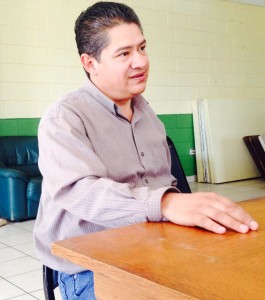 I was recently sitting in a Tijuana shelter that houses men for 12 days after they have been deported from the United States. I was guiding a group of pastors and leaders from around California and Arizona who wanted to learn the human story of immigration first hand. With that goal in mind, we simply sat with Gilberto, the director of the shelter, and asked him to tell some of his story and the story of those he has given his life to over the past 30 years.
I was recently sitting in a Tijuana shelter that houses men for 12 days after they have been deported from the United States. I was guiding a group of pastors and leaders from around California and Arizona who wanted to learn the human story of immigration first hand. With that goal in mind, we simply sat with Gilberto, the director of the shelter, and asked him to tell some of his story and the story of those he has given his life to over the past 30 years. 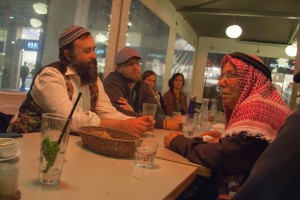 I was sitting in the airport the other day listening to yet another account of the current events unfolding in Israel and Palestine. Almost mechanically, the lips of the news anchor spilled out words like terrorists, extremist, escalating violence, detention, kidnapping, hatred, protest, etc.
I was sitting in the airport the other day listening to yet another account of the current events unfolding in Israel and Palestine. Almost mechanically, the lips of the news anchor spilled out words like terrorists, extremist, escalating violence, detention, kidnapping, hatred, protest, etc.  I’m sitting in my dad’s hospital room as a write this. Having just endured open-heart surgery, I have never seen or experienced him in this current state. Last night, as my sisters and I stood with him in the ICU singing, praying and telling him stories of his grandchildren, the only form of communication he could muster was a pained groan. He could hear us and was mentally strong, but to those with whom he loves most in the world, he could only offer a groan. Albeit, even a groan was a heroic effort on his part.
I’m sitting in my dad’s hospital room as a write this. Having just endured open-heart surgery, I have never seen or experienced him in this current state. Last night, as my sisters and I stood with him in the ICU singing, praying and telling him stories of his grandchildren, the only form of communication he could muster was a pained groan. He could hear us and was mentally strong, but to those with whom he loves most in the world, he could only offer a groan. Albeit, even a groan was a heroic effort on his part. 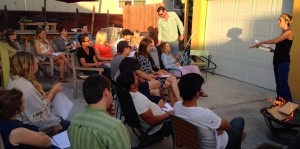 As in most things (parenting, theology, the Church, hospitality, etc), my wife, Janny, is about two years ahead me in asking these hard questions about the place of women in the world. Watching her study, teach and advocate on issues pertaining to the flourishing of women, I have been convicted, challenged and inspired.
As in most things (parenting, theology, the Church, hospitality, etc), my wife, Janny, is about two years ahead me in asking these hard questions about the place of women in the world. Watching her study, teach and advocate on issues pertaining to the flourishing of women, I have been convicted, challenged and inspired.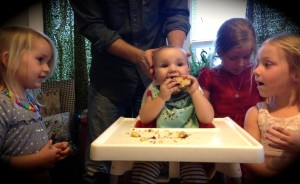 Paralleling my learnings, my little girls continue to grow, develop and form their view of the world, God and humanity each and every day. Our youngest, Rosie, recently turned one and we invited our close friends, neighbors and family to celebrate and bless her young life.
Paralleling my learnings, my little girls continue to grow, develop and form their view of the world, God and humanity each and every day. Our youngest, Rosie, recently turned one and we invited our close friends, neighbors and family to celebrate and bless her young life.